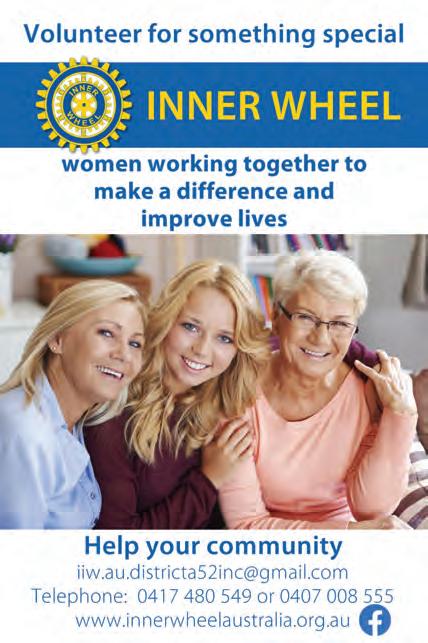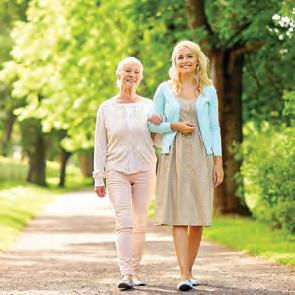
6 minute read
The menopausal transition
BY DIANA ARUNDELL NATUROPATHIC PRACTITIONER
All women over the age of 55 years will have experienced their own expression of menopause. Some will have naturally moved through the transition and for others, menopause may have been initiated by illness, medication or the surgical removal of the ovaries. The average age of menopause is 51 years (+/- 5 years). Menopause is considered premature if it occurs before the age of 40 years and it is uncommon as this only affects approximately 1% of women.
Menopause may be diagnosed retrospectively when a woman has not had a period for 12 months. Intermittent patterns of menopausal symptoms often occur as a woman’s cycle begins to change in response to fewer eggs in the ovaries. This is referred to as ‘peri-menopause’ as menstruation is still present, even if unpredictable. Peri-menopause is often experienced from mid 40’s onwards and will show up as shorter menstrual cycles mixed in with unusually longer cycles, dysfunctional bleeding, hot flushes, sleep problems and emotional disturbance. There appears to be a genetic influence to the age of the onset of menopause when studying mothers, daughters and siblings.
Most women will experience close to half of their life post menopause with some women continuing to experience t he effects of menopause longer term. For some the transition is relatively unremarkable however for others it can be a rocky ride requiring intervention to help support through the transition. 85% of women will experience more than 1 symptom with menstrual irregularity often being the first. Heavy or irregular bleeding is common due to fluctuations in estrogen production. As ovarian follicles diminish the responding production of estrogen, progesterone and testosterone also reduces. Mid-cycle bleeding, bleeding after sex or significant bleeding that is ongoing should be investigated further.
A day trip to remember... Ride the Ferry and have lunch at the Davo!

Ferry Trip & Lunch Package 2 Course Menu – Main & Dessert Minimum of 25 people ONLY $30 per head Only 2 minutes’ walk from Woy Woy station the M.V Saratoga departs Fisherman’s Wharf Monday to Friday at 10.45am and 12.30pm and on the weekends 9.30am, 10.45am or 12.30pm for a relaxing ride on the beautiful Brisbane Waters. There is an option of a 1 ½ hour COCKATOO ferry cruise departing from 10:15am with return on the regular ferry at 1:15pm or 2:15pm. Inform the Boat Captain and he will ring the club prior to your arrival where the bus will pick you up from Davistown Wharf and bring you to Davistown RSL Club. The bus will then depart the club at either 1.00pm and 2.00pm for your return journey home. Bookings are essential. For more information contact Davistown RSL Club on 4363-0103 and Central Coast Ferries on 0418 63 13 13. Email reception@davistownrsl.com.au
For your next group booking look no further than Davistown RSL with a wide variety of choices.
DAVISTOWN RSL CLUB
Other than irregular bleeding, the more common symptoms of menopause may include: hot flushes, vaginal dryness, urinary tract infections, increased visceral (abdominal) fat, muscle mass loss, sleep disturbance, bone density loss, brain fog, mood swings, hair loss and reduced libido.
Increased risk of osteoporosis and cardiovascular disease are associated with menopause. Cardiovascular disease can be significantly affected by diet and lifestyle choices and osteoporosis is one of those diseases that prevention is by far the best cure with healthy diet and lifestyle choices in the first half of life being the best prevention. The first 5 years of menopause is also significant in protecting bone density. Calcium requirements at menopause increase due to the increased loss of bone mineral density and as it may be difficult to consume the amount of calcium required from the diet, calcium supplementation (with vitamin D) may be required. If dairy is not tolerated there are many other excellent sources of calcium such as green leafy vegetables, nuts and seeds, nut butters, tahini and sardines.
Hot flushes appear to be one of the most common complaints from women transitioning through menopause. Women can experience anywhere from 1-100 hot flushes per day and these can vary in degree of intensity. Caffeine and alcohol consumption can worsen flushes in many women and regular exercise can improve flushes. There is some evidence to suggest that phytoestrogen containing foods especially those containing isoflavones can improve the severity of hot flushes. Examples of these foods include miso, tofu, flaxseeds and whole soy beans. These are best consumed in whole food form rather than supplement form and require ongoing, regular consumption. There has been much controversy about soy products over the years, however the most recent research suggests that organic, whole and non-genetically modified soy products are safe to consume in moderation and protective against reproductive cancers and their recurrence. There are a number of extremely effective herbs to help manage hot flushes and a qualified naturopath or herbalist will have access to stronger and better researched formulas that are not available over the counter. Sage is a useful culinary herb and the leaves consumed frequently as a tea or in salads can help the symptoms of hot flushes in some women.
Lowered levels of estrogen can also result in more frequent urinary tract infections, vaginal dryness and painful intercourse. Using liquid coconut oil topically as a natural lubricant can be useful as well as taking Alpha EFA (extracted from the sea buckthorn plant) supplements in therapeutic doses. These
are best sourced and prescribed by a qualified health practitioner for optimal quality and results.
Allopathic medicine offers hormone replacement therapy in various forms such as standard hormone replacement therapy and natural hormone replacement therapy in the form of patches, troches and tablets. Even though standard HRT has been shown to increase the risk of stroke and thrombosis it is still sometimes recommended for short term (1-5years) relief of menopause symptoms. Natural or bio-identical hormone replacement therapy is more commonly prescribed these days but still caution needs to be taken with women at risk of estrogen sensitive cancers. Taking any hormone can interfere with the natural feedback mechanisms of the body. As mentioned above there are many effective naturopathic alternatives to HRT that are worth trying to alleviate the undesirable symptoms of menopause.
Diana Arundell is a university-qualified naturopath and consults from her Avoca Naturopath clinic. She has a special interest in fertility and pregnancy health, digestive health, immune function and family wellness programs. She was a nutrition lecturer at Macquarie University for 10 years, and is an accredited Journey Practitioner. For further information please contact Diana Arundell at Avoca Naturopath on 0410 465 900.
Plan now for the time of your life Call 02 4304 5941 today and start the conversation. VISIT OUR NEW ERINA OFFICE AT 1/312 CENTRAL COAST HIGHWAY Don’t put your Golden Years in uncertain hands Know your future is in safe hands with the experience of CCFPG’s team of five Retirement experts. We are here to help you and your family with all your retirement financial planning needs.
DJIB Investments Pty Ltd T/A Central Coast Financial Planning Group is a Corporate Authorised Representative of RI Advice Group Pty Ltd, ABN 23 001 774 125 AFSL 238429.








